| Srl | Item |
| 1 |
ID:
112637
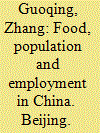

|
|
|
|
|
| Publication |
Beijing, Foreign Languages Press, 2006.
|
| Description |
127p.
|
| Standard Number |
7119044680
|
|
|
|
|
|
|
|
|
|
|
|
Copies: C:1/I:0,R:0,Q:0
Circulation
| Accession# | Call# | Current Location | Status | Policy | Location |
| 056464 | 303.951/GUO 056464 | Main | On Shelf | General | |
|
|
|
|
| 2 |
ID:
163364
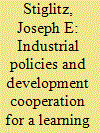

|
|
|
|
|
| Summary/Abstract |
In the countries that have been most successful in development over the past half century, government played a central role (the development state), especially through industrial policies that promoted manufacturing exports. But changes in the global economy mean that African countries won’t be able to rely on the manufacturing export-led growth model. This paper analyzes the reasons for the success of that model, and shows how the same outcomes can be achieved through a multipronged strategy, a comprehensive development plan that pays particular attention to learning and employment.
|
|
|
|
|
|
|
|
|
|
|
|
|
|
|
|
| 3 |
ID:
163765
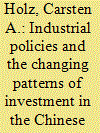

|
|
|
|
|
| Summary/Abstract |
Investment has always played an important role in the economic development strategies of the People’s Republic of China. A major reform of the investment system in 2004 shifted the state’s focus from direct investment control to industrial policies designed to promote investment in specific economic sectors. But in reality, the industrial policies’ preferences have had little effect. The data suggest that investment patterns in China are largely divorced from the industrial policies, and, if anything, predate them. The significant shifts in investments across sectors and ownership forms that have taken place since the early 2000s appear driven far more by profitability considerations and private entrepreneurship than by government policies. The finding negates foreign concerns that the Chinese state via industrial policies such as “Made in China 2025” is creating national state-owned technological leaders.
|
|
|
|
|
|
|
|
|
|
|
|
|
|
|
|
| 4 |
ID:
126967


|
|
|
|
|
| Publication |
2013.
|
| Summary/Abstract |
Although China's use of the WTO dispute settlement system has increased, its legal actions remain less aggressive than those of other large economies. This article examines how China's subsidy policies make Chinese leaders reluctant to use WTO dispute settlement mechanisms in resolving trade disputes with other countries.
|
|
|
|
|
|
|
|
|
|
|
|
|
|
|
|
| 5 |
ID:
183634
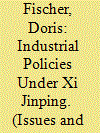

|
|
|
|
|
| Summary/Abstract |
Xi Jinping’s ascension to power and subsequent developments in Chinese governance have stoked the flames on the debate on industrial policies, both in China and across the globe. At least partly, the debate results from the perception that industrial policies have been important for China’s economic rise, growing competitiveness and drive to innovate. Outside China, this perception has already prompted some governments to suggest that their countries should react to China’s rise by also promulgating industrial policies. But inspite of the growing interest in the topic, there is hardly a consensus on the character of China’s industrial policies nor their efficiency and effectiveness, neither inside nor outside of China. This paper will shed light on these issues by looking at Chinese industrial policies from the perspective of political steering theory. It will first review the political steering theory, identify key concepts (steering modes, steering objects and subjects, etc.) and then explain the rationale of applying the theoretical deliberations to industrial policymaking and implementation in China’s EV and solar sectors. Against this background, this paper will identify different types of industrial policies and look into Chinese industrial policy development and academic discussion over time with a specific focus on changes in industrial policy steering following the inauguration of the Xi Jinping administration. This paper aims to make a conceptual contribution based on the analysis of policy documents and academic texts as well as discussions and interviews with Chinese economists and political scientists. It is part of a larger research project that focuses on how political steering through industrial policies affects China’s energy transition under Xi.
|
|
|
|
|
|
|
|
|
|
|
|
|
|
|
|
| 6 |
ID:
130585
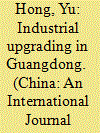

|
|
|
|
|
| Publication |
2014.
|
| Summary/Abstract |
Guangdong has played an important role and been in the vanguard of China's economic reforms and opening up since 1978. Industrial production in Guangdong has expanded rapidly, which in turn led to rapid growth in the economy. Fast industrialisation followed and Guangdong has since developed to become the industrial powerhouse for China and the world. Nevertheless, over the recent years, Guangdong has been facing both internal and external pressures to increase its industrial competitiveness and undertake industrial upgrading. Industrial upgrading has been the focal point of government policies since the early 2000s. However, the results from industrial upgrading are not too encouraging and problematic industrial policies have thwarted the government's aspirations for industrial upgrading rather than speeding up the process. In addition, Guangdong's aspirations to move up the value chain and achieve industrial upgrading are met with various obstacles and challenges. Guangdong's industrial development is still mainly driven by the low-end and low value-added manufacturing industry, and the status quo of Guangdong as the world's low-end assembly and processing base remains unchanged.
|
|
|
|
|
|
|
|
|
|
|
|
|
|
|
|